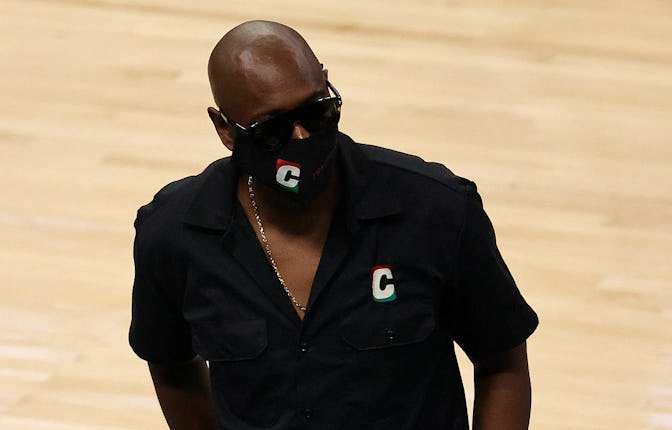Netflix's CEO made his priority clear — and it's not trans lives
Ted Sarandos said that Netflix believes “content on screen doesn’t directly translate to real-world harm.” But he's forgetting about one thing.

On Monday, Netflix CEO Ted Sarandos emailed Netflix’s entire staff to say that the platform was ultimately not going to remove Chappelle’s The Closer special because Netflix believes “content on screen doesn’t directly translate to real-world harm.”
Sarandos pointed to the increased prevalence of violence in TV and video games over the last 30 years coinciding with a significant decrease in violent crimes across various countries. There’s credence to his claim, including a 2016 study from the American Academy of Pediatrics and the American Psychological Association which concluded media violence had minimal effects on aggression among children. Sarandos focused specifically on the media’s influence on violent crimes because the perceived concern around The Closer is the potential for increased real-world harm. But narrowing the focus on violent crimes dismisses the emotional harm that trans communities endure.
A study released in January in the U.S. National Library of Medicine’s PubMed Central journal concluded: “a greater frequency of exposure to negative depictions of transgender people in the media was significantly associated with clinically significant symptoms of depression.” In Chappelle’s special, the comedian proclaimed he was “team TERF,” the acronym for trans-exclusionary radical feminists who reject trans women as women. Before identifying with TERF, he explains how the TERF community compares trans women’s identification as women to the way that Black people view other races using blackface — a belief that is fundamentally inaccurate since blackface is a temporary performance and being trans is an immutable identity.
Netflix’s support of offensive content until there are real-world consequences is, alarmingly, part of their business model. It took the streaming giant two years to remove a graphic suicide scene from the first season of its hit show 13 Reasons Why even after parents, mental health experts, and educators all raised concern over the potential for vulnerable teenagers to emulate the act. The company’s immediate remedy was placing warnings before episodes 9, 12, and 13 that notified viewers of graphic depictions of rape and sexual assault which may not be suitable for young adults.
Shortly after including those warnings, Netflix included a warning before the first episode of the season, encouraging those affected by the show’s content to reach out to Samaritans, a suicide prevention network. Netflix wouldn’t remove the show, or even just the episode featuring the graphic suicide scene, partly due to reactions they received from viewers on how the show was “a valuable driver for starting important conversation with their families.”
That all changed in April 2019, when a study in the Journal of the American Academy of Child and Adolescent Psychiatry revealed that in the month after 13 Reasons Why premiered, the suicide rate for boys between the ages of 10-17 had surged to the highest level it’s been in the five years prior. Three months later, Netflix finally removed the scene from the first season “on the advice of medical experts,” even though medical experts had called for the scene’s removal for years. While Netflix surely valued the medical expertise of experts like Christine Moutier, the chief medical officer at the American Foundation for Suicide Prevention who helped advise Netflix on the scene deletion, Sarandos not removing The Closer too warily relies on seeing real-world violence before making real-world changes. And aside from research and studies, does a community that’s already facing exclusion and discrimination need anything else going against it?
That is an inherently dangerous stance to take, as one could deduce a proactive removal of the suicide scene before the series premiered on March 31, 2017 could’ve saved those young boys who took their lives a month after the show aired. Sarandos’s email also cited how Chappelle’s special didn’t violate the company’s Sensitive Content guidelines because they believe Chappelle never intended to incite hatred or violence against anyone. The 13 Reasons Why suicide scene also wasn’t intended to cause harm, but studies show it likely did. Netflix waiting until there is actual violence they can link to a special which is applauded for invalidating the identities of trans people appears to be purposefully shortsighted in an effort to not lose content from a comedian who has given the streamer three Emmys, three Grammys, and an untold number of new subscribers.
Chappelle supporters or anti-censorship advocates may believe that taking down the special both neuters creators’ freedom and stops important conversations before they can even get started. Presenting the specials with as much as a disclaimer that the content may be offensive would be a start in the right direction, but that’d be too close to the service admitting wrongdoing by playing it in the first place. Netflix has chosen a side, and it’s not the compassionate or cautious one.